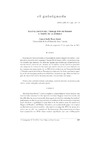Identificador persistente para citar o vincular este elemento:
https://accedacris.ulpgc.es/jspui/handle/10553/12103
| Campo DC | Valor | idioma |
|---|---|---|
| dc.contributor.author | Reyes García, Carmen Isabel | en_US |
| dc.date.accessioned | 2014-08-01T02:30:29Z | - |
| dc.date.accessioned | 2018-03-15T14:27:55Z | - |
| dc.date.available | 2014-08-01T02:30:29Z | - |
| dc.date.available | 2018-03-15T14:27:55Z | - |
| dc.date.issued | 2013 | en_US |
| dc.identifier.issn | 0213-0610 | en_US |
| dc.identifier.other | WoS | - |
| dc.identifier.uri | https://accedacris.ulpgc.es/handle/10553/12103 | - |
| dc.description.abstract | En el área de Ciencias Sociales en la actualidad, dada la situación novedosa y compleja de la evaluación de la asignatura Trabajo Fin de Grado (TFG), se precisa de nuevos modelos que orienten a los diferentes agentes que tendrán que desarrollar la evaluación: tutores, miembros del tribunal, etc. El objetivo en este artículo es presentar una propuesta de evaluación alternativa que oriente a los tutores en la valoración de las competencias transversales de los TFG de las titulaciones de Educación Infantil y Primaria a través de la rúbrica. Presentamos el proceso de diseño que hemos seguido en dos rúbricas para establecer su calidad. Las orientaciones que ofrecemos han surgido de una revisión de la literatura existente y de un trabajo de campo. The Final Year Project, a new compulsory subject linked to Social Sciences, has been recently introduced in the Spanish University Degrees. Given its novelty and the difficulties its assessment entails, those agents, involved in evaluating the students' perform ance on this subject (e.g. supervisors, members of the assessment committee), need a fresh set of guidelines to assist their work. In order to meet this need in the Degrees of Preschool and Primary Education, our objective in this paper is to propose an alternative assessment model to help supervisors judge the TFGs by means of a rubric, and we offer two examples of this instrument. These assessment tools have been adapted for the TFGs where students specifically carry out a bibliographic review. The guidelines that we suggest here are the result of both the revision of existing research and fieldwork. | en_US |
| dc.description.abstract | The Final Year Project(1), a new compulsory subject linked to Social Sciences, has been recently introduced in the Spanish University Degrees. Given its novelty and the difficulties its assessment entails, those agents, involved in evaluating the students' performance on this subject (e.g. supervisors, members of the assessment committee), need a fresh set of guidelines to assist their work. In order to meet this need in the Degrees of Preschool and Primary Education, our objective in this paper is to propose an alternative assessment model to help supervisors judge the TFGs by means of a rubric, and we offer two examples of this instrument. These assessment tools have been adapted for the TFGs where students specifically carry out a bibliographic review. The guidelines that we suggest here are the result of both the revision of existing research and fieldwork. | en_US |
| dc.format | - | |
| dc.language | spa | en_US |
| dc.relation.ispartof | El Guiniguada | en_US |
| dc.source | Guiniguada [ISSN 0213-0610], v. 22, p. 128-148, (2013) | en_US |
| dc.subject | 58 Pedagogía | en_US |
| dc.subject | 580106 Evaluación de alumnos | en_US |
| dc.subject.other | Learning-Oriented Assessment | en_US |
| dc.subject.other | Alternative Assessment | en_US |
| dc.subject.other | Final Year Project | en_US |
| dc.subject.other | Rubric | en_US |
| dc.subject.other | Bibliographical Revision | en_US |
| dc.subject.other | Higher Education | en_US |
| dc.subject.other | Evaluación orientada al aprendizaje | en_US |
| dc.subject.other | Evaluación alternativa | en_US |
| dc.subject.other | Trabajo fin de grado | en_US |
| dc.subject.other | Rúbrica | en_US |
| dc.subject.other | Revisión bibliográfica | en_US |
| dc.subject.other | Educación superior | en_US |
| dc.title | La evaluación del Trabajo Fin de Grado a través de la rúbrica | en_US |
| dc.title.alternative | The evaluation of End-of-Grade Work through heading | en_US |
| dc.type | info:eu-repo/semantics/article | en_US |
| dc.type | Article | en_US |
| dc.identifier.isi | 000215085800008 | - |
| dc.compliance.driver | 1 | - |
| dc.identifier.absysnet | 235347 | - |
| dc.identifier.eissn | 2386-3374 | - |
| dc.description.lastpage | 148 | en_US |
| dc.description.firstpage | 128 | en_US |
| dc.relation.volume | 22 | en_US |
| dc.investigacion | Artes y Humanidades | en_US |
| dc.rights.accessrights | info:eu-repo/semantics/openAccess | - |
| dc.type2 | Artículo | en_US |
| dc.contributor.daisngid | 4134139 | - |
| dc.description.numberofpages | 21 | en_US |
| dc.utils.revision | Sí | en_US |
| dc.contributor.wosstandard | WOS:Garcia, CIR | - |
| dc.date.coverdate | 2013 | en_US |
| dc.identifier.ulpgc | Sí | en_US |
| dc.description.sellofecyt | Sello FECYT | |
| dc.description.esci | ESCI | |
| dc.description.dialnetimpact | 0,0 | |
| dc.description.dialnetq | Q4 | |
| dc.description.erihplus | ERIH PLUS | |
| item.grantfulltext | open | - |
| item.fulltext | Con texto completo | - |
| crisitem.author.dept | GIR IATEXT: Didáctica, Aprendizaje y Motivación en Contextos Específicos | - |
| crisitem.author.dept | IU de Análisis y Aplicaciones Textuales | - |
| crisitem.author.orcid | 0000-0001-6534-9359 | - |
| crisitem.author.parentorg | IU de Análisis y Aplicaciones Textuales | - |
| crisitem.author.fullName | Reyes García,Carmen Isabel | - |
| Colección: | Guiniguada. 2ª Etapa. n.22, 2013 Artículos | |
Los elementos en ULPGC accedaCRIS están protegidos por derechos de autor con todos los derechos reservados, a menos que se indique lo contrario.
